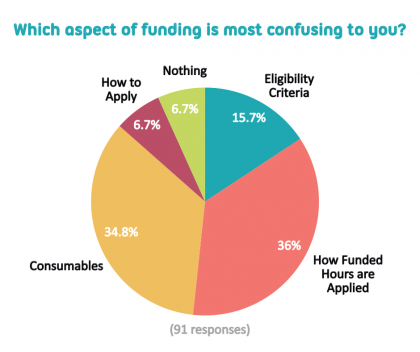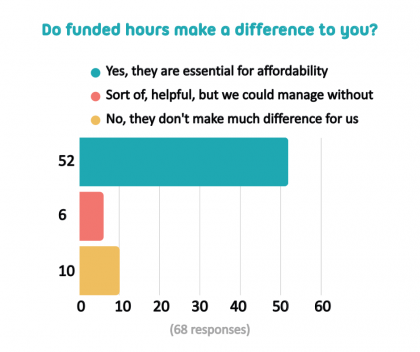
Blog
The Ultimate Guide to Nursery Fees and Funding 2025
At Kindred we strongly believe that funding should be simple, convenient and inclusive. So we've put together our ultimate guide to fees and funding, sharing real parent experiences, highlighting clear examples, and showing you how to make the most out of every funding option available.
Introduction
Childcare costs are one of the biggest worries for UK parents. Monthly nursery fees can create a lot of financial pressure for families. In fact, 76% of parents we polled said that government funding is essential for nursery affordability[1].
From September 2025, the government expanded funded hours for eligible working parents with children aged 9 months to school age from 15 to 30 hours a week. A change that could help families save a substantial sum each year.
But for many parents, knowing exactly how funding works isn’t always straightforward. In fact, 70% of parents in our poll said they were most confused by consumables and when funded hours can actually be used.[2]
At Kindred we strongly believe that funding should be as simple, convenient and inclusive as possible for families. That’s why we’ve put together this comprehensive guide, sharing real parent experiences and showing you how to make the most out of every funding option available.
Find out more about funding at Kindred


Case Study: How Funding Changed Emma’s Life
We wanted to see how the 30 hours funding makes a difference for real families, so we sat down with one of our Kindred parents, Emma.
Emma’s daughter now attends nursery 5 days a week. She told us that without the funding, she simply wouldn’t be able to work the hours that she does.
“Working part time put my career on hold” she said. “Now with the funding I don’t have to worry about that anymore.”
For Emma, the new funding also meant she didn’t have to compromise on quality or best fit: “You don’t have to choose the cheapest option; you can pick the nursery that’s best for your child.”
Like many parents, Emma said that understanding funding at first was confusing especially when it came to consumables and non-term time hours.
But she also found that once she realised the Tax-Free Childcare could be used on top of the 30 funded hours, the savings were bigger than expected: “It doesn’t sound like much, £2 off every £8, but it really adds up.”
Emma’s advice to other parents is simple:
-
Don’t leave it too late. Emma’s code took a long time to come through when she first applied.
-
Know the cut-off dates for applications.
-
Speak to your nursery manager if you’re unsure about anything: “They know more than what you can find online sometimes.”
What funding options are available?
There are currently five main childcare funding schemes in the UK:
| Funding Option | Who it's for | What you get |
|---|---|---|
| 30 Hours Funded Childcare | Eligible working parents with children aged 9 months to school age | Up to 30 funded hours per week during term time |
| 15 Hours Early Learning for 2s | Families with limited resources or those receiving certain benefits | 15 funded hours per week |
| 15 Hours Universal Funding | All families with children aged 3–4 | 15 funded hours per week |
| Universal Credit Childcare | Working families claiming Universal Credit | Support with childcare costs |
| Tax-Free Childcare | Working families earning under £100k | The government tops up £2 for every £8 you spend, up to £2,000 per child per year or £4,000 for children with disabilities. |
Each scheme has different eligibility rules, use the Best Start in Life eligibility checker to see what funding you’re eligible for.
The Universal Credit Childcare and Tax-Free Childcare schemes can be combined with some others for even greater savings.
Who is Eligible?
Funding eligibility depends on your circumstances. Here are some common family examples:
Dual-working household earning under £100k each: Likely eligible for 30 hours funding and Tax-Free Childcare.

Single parent working part-time, earning under £16,190 a year and claiming UC: May qualify for Universal Credit Childcare and Universal 15 hours.

Stay-at-home parent with a working partner: Might still qualify for 30 hours if the non-working parent receives benefits like Carer’s Allowance or Incapacity Benefit.

30 Hours Funded Childcare
-
Both parents (or the sole parent in a single-parent household) must be working, on parental leave, annual leave, or sick leave.
-
Each parent must earn the equivalent of at least 16 hours per week at the National Minimum Wage.
-
Not available for families where any individual earns more than £100,000.
15 Hours Early Learning (for 2-year-olds)
-
Available if you have a child aged or about to turn 2 and:
-
Household income is under £16,190, or
-
You receive benefits such as Job Seekers Allowance, Income Support, or Employment and Support Allowance
Universal 15 Hours (for ages 3-4)
-
All families automatically qualify; no application is required.
Tax-Free Childcare
-
Available if you are in qualifying paid work (including self-employment, parental leave, sick leave, annual leave).
-
Not available for families where any individual earns more than £100,000.
Not Working?
-
You may still qualify for the early learning 15 funded hours for 2-year-olds if you receive certain benefits.
-
Some families may also qualify for the 30 hours if one parent works and the other receives benefits such as Carer’s Allowance or Incapacity Benefit.
What are consumables and why am I charged for them?
Government funding only covers the care hours themselves. It does not cover the cost of:
-
Meals and snacks
-
Nappies, wipes, sun cream
-
Additional hours outside your funded entitlement
-
Enrichment activities
These items are known as consumables. Consumable charges exist purely to cover the costs of these extras; they are not a way of topping up childcare fees.
Across the UK, there are some clear rules:
- Government guidance makes it clear that nurseries cannot charge families to make up the difference between government funding and their standard hourly rate.
- Consumable charges must be transparent. Parents should see exactly what’s included.
- Consumable charges must be optional. Families should always have the choice to provide their own.
Our Practical Tips to Get the Most Out of Funding
-
Stretch your hours: Instead of 38 weeks, spread your funded hours across 50–51 weeks. This means fewer hours per week, but year-round support.
-
Combine schemes: Use Tax-Free Childcare alongside your funded hours for extra savings.
-
Don’t miss deadlines: Apply the term before your child is eligible - missing a date can mean waiting until the next term.
How to Apply
30 Funded Hours (from age 9 months)
-
Apply the term before you want to start.
-
Key deadlines:
| When your child turns 9 months: | When you can get your hours from: | When you should apply: |
|---|---|---|
| 1st Jan - 31st March | Term starting on or after 1st April | Ideally before end of Feb. Deadline 31st March |
| 1st Apr - 31st Aug | Term starting on or after 1st Sept | Ideally before end of July. Deadline 31st Aug |
| 1st Sep - 31st Dec | Term starting on or after 1st Jan | Ideally before end of Nov. Deadline 31st Dec |
-
Apply online for a code via your government childcare account.
-
Share the code, your NI number, and your child’s date of birth with your nursery.
-
Reconfirm every 3 months to keep eligibility active.
15 Universal Hours (age 3–4)
-
No code needed; hours will be received automatically the term after your child turns 3.
| When your child turns 3: | When you will receive your hours from: |
|---|---|
| 1st Jan - 31st March | Term starting on or after 1st April |
| 1st April - 31st Aug | Term starting on or after 1st Sept |
| 1st Sept - 31st Dec | Term starting on or after 1st Jan |
- No application is necessary; you just need to share your child’s birth certificate with your childcare provider.
Frequently Asked Questions
“Why does my funded childcare look like fewer hours per week when I stretch it across the full year?”
The government funding is set at 30 hours a week for 38 weeks of the year (term time). If you’d like to use your funding across all 51 weeks (or the number of weeks your nursery is open), those hours are simply spread out more evenly. This means the weekly funded hours are lower, but the total number of funded hours you receive in a year stays exactly the same.
At Kindred, we offer both the term-time and stretched-year options so that families can choose what works best for their routines, making funding as convenient and accessible as possible for every family’s unique needs.
“Can I backdate funding?”
No. Funding only starts once you have applied, and your eligibility has been confirmed by the government and therefore cannot be backdated.
“What happens if my circumstances change?”
If you lose your job or your income changes, a grace period is given so that your child can continue to access their funded hours while you re-confirm eligibility.
“Can I really use my 30 hours at more than one nursery?”
Yes, you can split your funded hours between up to two childcare providers.
“Can I apply while on maternity leave?”
Yes, if you expect to be back at work within 31 days of the funding start date.
Conclusion
At Kindred, we know that childcare funding can be complicated; but it doesn’t have to be. We are committed to making funding as simple, convenient, and inclusive as possible for every family.
If you’re just starting to explore childcare options, our team would love to help you understand how funding could work for your family. Even if you’re not ready to choose a nursery yet, we’re here to make the process easier.
Learn more about funding at Kindred Nurseries or drop us an email at enquiries@kindrednurseries.co.uk , we’ll be happy to answer any questions you might have.
Footnotes
[1] Results taken from our poll ran on Instagram 03/09/2025. Participants were asked “Do funded hours make a difference to you?”. We received 68 responses to this question.
[2] Results taken from our poll ran on Instagram 03/09/2025 and our poll with parents from Kindred Hemel Hempstead, Kindred Enfield and Kindred Orpington. Participants were asked “Which aspect of funding do you find most confusing?”. We received 91 responses to this question.
